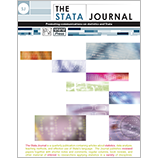mfpa: Extension of mfp using the ACD covariate transformation for enhanced parametric multivariable modeling
Patrick Royston
MRC Clinical Trials Unit
University College London
London, UK
[email protected]
|
Willi Sauerbrei
Center for Medical Biometry and Medical Informatics
Medical Center–University of Freiburg
Freiburg, Germany
[email protected]
|
Abstract. In a recent article, Royston (2015, Stata Journal 15: 275–291)
introduced the approximate cumulative distribution (ACD) transformation of a
continuous covariate x as a route toward modeling a sigmoid
relationship between x and an outcome variable. In this article, we
extend the approach to multivariable modeling by modifying the standard Stata
program mfp. The result is a new program, mfpa, that has all the
features of mfp plus the ability to fit a new model for user-selected
covariates that we call FP1(p1,p2). The
FP1(p1,p2) model comprises the
best-fitting combination of a dimension-one fractional polynomial (FP1)
function of x and an FP1 function of ACD(x). We describe a new
model-selection algorithm called function-selection procedure with ACD
transformation, which uses significance testing to attempt to simplify an
FP1(p1,p2) model to a submodel, an FP1 or
linear model in x or in ACD(x). The function-selection procedure
with ACD transformation is related in concept to the FSP (FP
function-selection procedure), which is an integral part of mfp and
which is used to simplify a dimension-two (FP2) function. We describe the
mfpa command and give univariable and multivariable examples with real
data to demonstrate its use.
View all articles by these authors:
Patrick Royston, Willi Sauerbrei
View all articles with these keywords:
mfpa, mfp, continuous covariates, sigmoid function, ACD transformation, multivariable fractional polynomials, regression models
Download citation: BibTeX RIS
Download citation and abstract: BibTeX RIS
|
